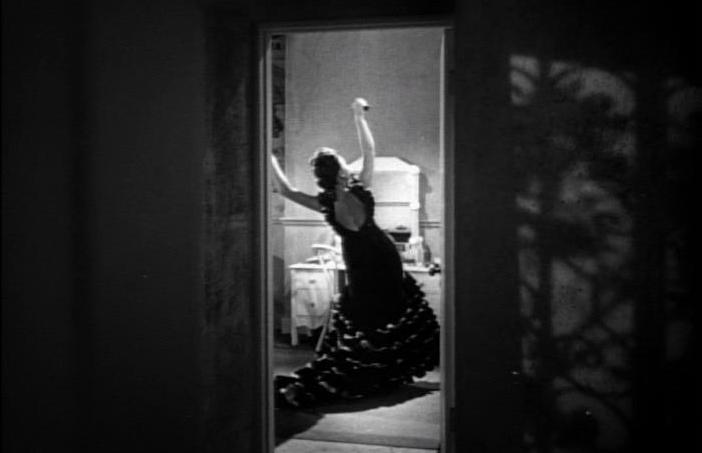From Film Comment, September-October 1984. — J.R.


Rear Window, The Leopard Man [see first two photos above], Phantom Lady, The Window, The Bride Wore Black, Mississippi Mermaid. Considering that almost 30 features have been Cornell Woolrich adaptations, it seems a genuine anomaly that he should remain so shadowy a figure. He is as central to the thriller as Olaf Stapledon is to science fiction, and has been comparably eclipsed by a singularity that exceeds and surpasses some genre expectations while grievously falling short of certain others. Despite all the purple prose, tired rewrites, and preposterous plots that crop up in his fiction, perhaps no other writer handles suspense better, or gives it the same degree of obsessional intensity. More soft-boiled than hard-boiled in the depiction of his heroes and heroines, Woolrich nonetheless seems central to the overall pessimism of film noir in the violent contrasts of his moods and the dark tempers of his villains.
Webster’s New Collegiate gives three definitions of dreadful: “(1) (adjective) inspiring fear or awe, (2) (adjective) distressing, shocking; very distasteful, (3) (noun) a morbidly sensational story or periodical; as, a penny dreadful.” Woolrich assumes all these meanings and invents a few more of his own. Read more

Although I couldn’t bring myself to watch all of Trump’s rally speech in Tulsa last night, I did tune into the Fox channel enough times to catch the gist of most of it. I wanted to solve the mystery about what was attractive enough to the 6200 or so mostly unmasked individuals to risk their lives and those of their friends and families in order to see and hear him rant and strut and thank everybody in person. And I think I came away with a provisional answer. (For those who missed all of it, or even some of it, I’m pasting the transcript of his endless dribble below in bold, all 28 pages of it.)
As usual, his spiel was all about grievance. The fact that he seemed to spend an eternity complaining about the media treatment of his walk down a ramp after his West Point graduation speech and his use of two hands while sipping water during the speech — what seemed like at least 15 minutes (or about four of the 28 pages) seeking to justify his behavior over just a few seconds — only proved that his inferiority complex was still the most discernible aspect of his ego, and clearly an aspect that many or most of his 6200 or so fans shared. Read more
An essay written for Toronto’s Cinematheque Ontario program guide (February 2007). –- J.R.

For better and for worse, and principally the latter, Jacques Rivette has been singled out as the former Cahiers du Cinema film critic who makes the least commercial films, as well as the longest ones. But for the record, the films of the always-neglected Luc Moullet [screened in Cinematheque Ontario’s Spring 2006 season –- ed.] are generally less commercial than those of Rivette. And even what we mean when we say “longest films” is open to some debate. (After all, the over twelve-hour OUT 1: NOLI ME TANGERE was conceived as a TV serial, and Jean-Luc Godard’s own first TV series, made a few years later, was just as long.)
The problem with such caricatures is they generally function as excuses for why some spectators won’t deal with Rivette’s films rather than as viable descriptions of what they offer. Yes, his features tend to be long and they work with duration. Furthermore, when two versions have been made of some of them –- unauthorized in the case of L’AMOUR FOU, authorized in the cases of L’AMOUR PAR TERRE and LA BELLE NOISEUSE/ DIVERTIMENTO – the longer version is almost always superior. Read more




